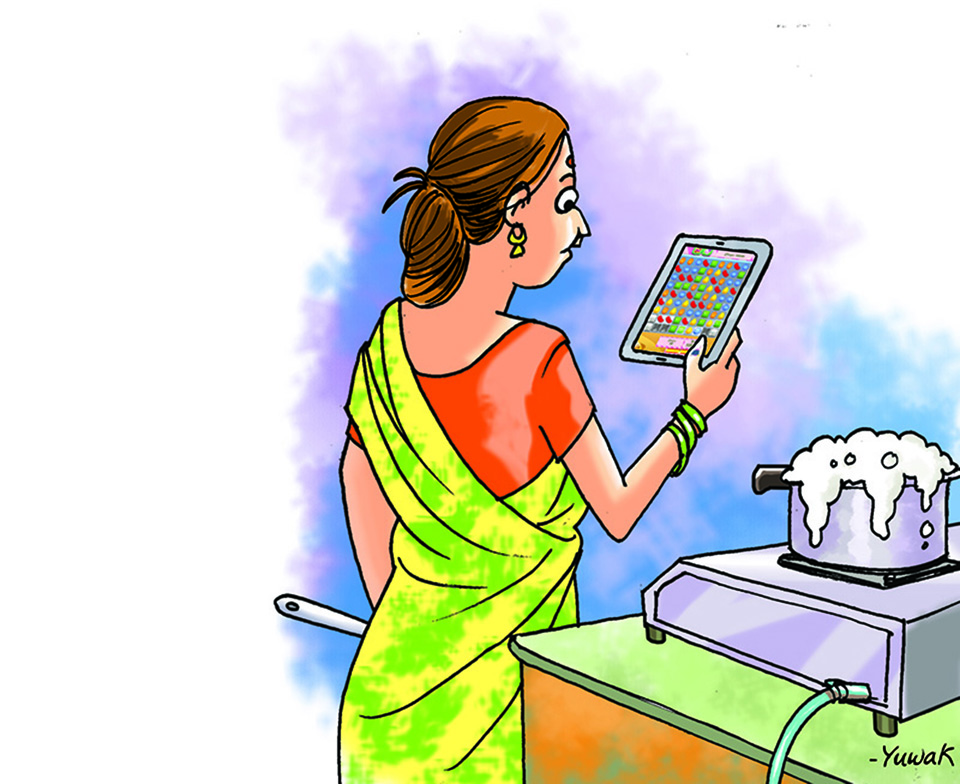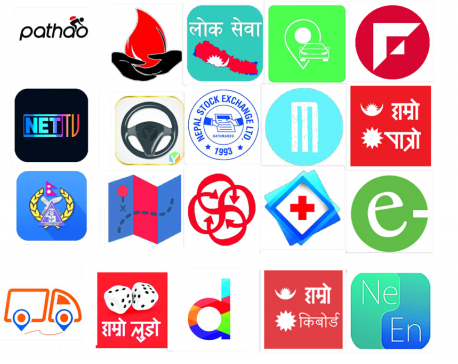
OR

Technology is so woven into our lives that we cannot imagine life without it. The overall advancement of technology has changed not only the way we live our everyday lives, but also the way the world communicates. When we are so dependent on gadgets and devices to live, entertain, interact and work it is difficult for us to focus on the experiences that truly bring value into our lives.
The amount of time we spend on the internet every day has enslaved us to the convenience and speed it offers to communicate and work. Therefore, we start our day by reaching for our smartphone as soon as we wake up to check emails and respond to messages. The rest of the day we are constantly on the phone, laptop or tablet messaging, browsing, tweeting or sharing. Smitten by the technological bug, we are always online, plugged in, or connected.
But, are we really connected? Or are these gadgets disconnecting us from the real world? Isn’t technology supposed to supplement our relationships rather than replace them? When these thoughts cross my mind, I start to wonder if we are addicted to technology.
Addiction is real
One of my friends was traveling from Mumbai to Delhi. He reached home at midnight and as he was unpacking his bag, he couldn’t find his cell phone as well as the laptop charger. After frantically searching for it he realized that he had kept all the chargers in a separate packet and taken it out to charge his phone in the aircraft. Unfortunately, he forgot to keep the packet back in his bag while deboarding. Somehow, he managed to get it traced by the airline staff and was happy to drive at one AM to the airport to get it back. On hearing this, I was more concerned than startled to hear he drove back to the airport past midnight.
I was concerned for his wellbeing. For him, the need to be ‘online’ was far greater than the need to rest after a tiring journey. Somewhat similar to ‘Nomophobia’ defined as having a fear of not being with your phone. His desperate urge to charge the phone made me believe that this addiction is real. Technology addiction or phone addiction whatever we may call it, let’s accept the fact that we are as dependent on technology as we are on air, food, and water.
In pursuit of instant gratification of our needs we have various apps to shop, travel, manage finances and even to find a date. While we happily click on these apps, we tend to forget that we are letting our dependency on them seep into every corner of our lives, and not just virtually. As internet burrows deep into our lives we get hooked on web browsing, social networks, and online gaming or just scrolling our lives away.
According to a report by Bankmycell, the average smartphone user checks their device 47 times a day and 17,155 times a year and 85 percent of smartphone users will check their device while speaking with friends and family. Much worse, the average user will tap, swipe and click their phone 2,617 times a day. This data is not just a number. It represents each one of us who are constantly on phone either due to work or by choice. What about children?
Think of children
The recent news about a three-year-old boy from Bareilly, the northern Indian state of Uttar Pradesh, should be an eye-opener to all parents. The toddler who didn’t stop wetting his bed was taken for counseling to the district hospital. His parents were exasperated to hear that the boy was addicted to mobile phone. Reportedly the child who spent nearly eight hours a day watching popular cartoons ‘Doremon’ and ‘Motu Patlu’ was not going to relieve himself because he didn’t want to leave the phone for even a few minutes.
Therefore, when I see parents letting their kids get engrossed on to their tablets and earphones plugged on to their ears it worries me. Not because these electronic gadgets are expensive for a kid to handle but because this may lead to kid’s addiction to the internet at such an early age. Internet addiction among children is already a growing concern all over the world.
Some children cannot study without listening to music, others cannot eat without watching their favorite cartoon and there are many who are, most of the time, glued to their gaming consoles. With World Health Organization including ‘gaming disorder’—the inability to stop gaming—into the International Classification of Diseases, it is imperative for parents to cut down the screen time for kids, anyhow.
Cutting down screen time will not be easy because more the amount of time a child is habituated in being glued to the screen, greater is the resistance to follow the new restrictions. Mandy Saligari, addiction and relationship expert, is right in saying ‘when you are giving your children a phone or a tablet, it’s like you’re giving them a bottle of wine or a gram of coke.’ Therefore, let’s not be happy when a toddler learns to swipe, click, scroll and search rather let’s be aware that this can be the first step to digital addiction. If we don’t limit their screen time these young minds will not know how much is too much.
Time for digital wellbeing
Dependency on technology is not bad but too much of it may affect our well-being. Our constant interaction with the digital domain shapes the way we learn; the way we form relationships and the way we interact and nurture it. Only when it subtly destroys the meaningfulness of human interactions and replaces it with emoticons, we realize how disconnected we can become with what’s going on while connecting with the digital world.
This disconnection is because we are overwhelmed by the deluge of information we get, distracted by every notification or perhaps always anxious about the appearance of our social media profiles. Every new text, email or alert injects a hit of dopamine into our brain making us feel important and, in a way, satisfies our need for social belongingness. The more we interact in our digital world and the more we get tempted to check our phones with every notification, the greater is our dependency on our digital devices which is as great, if not greater, than our dependency on bodily nutrition.
Therefore, it is time to digitally detox ourselves, from time to time. Internet, phones, connections and social media are important but creating a balance between our ‘online’ life and our ‘offline’ life is way more important for our wellbeing. And sometimes it is necessary to disconnect from the world to reconnect with your own self.
The author, a freelancer based in New Delhi, is also a management expert at EMERGE, Nepal
You May Like This

20 useful apps for 2020
There are thousands of applications for both iOS- and Android-powered smartphones. From apps of banks to e-commerce platforms, they have... Read More...

Finance Minister stresses on using technology to boost agricultural production
KATHMANDU, Nov 21: Finance Minister Dr Yuba Raj Khatiwada has said the agriculture sector could not be transformed as the... Read More...

Nepali OCT Technology for visually impaired people launched
KATHMANDU, Aug 21: Now the visually challenged people in the country could comprehend Nepali printed materials independently using Nepali Optical... Read More...





Just In
- CM Kandel requests Finance Minister Pun to put Karnali province in priority in upcoming budget
- Australia reduces TR visa age limit and duration as it implements stricter regulations for foreign students
- Govt aims to surpass Rs 10 trillion GDP mark in next five years
- Govt appoints 77 Liaison Officers for mountain climbing management for spring season
- EC decides to permit public vehicles to operate freely on day of by-election
- Fugitive arrested after 26 years
- Indian Potash Ltd secures contract to bring 30,000 tons of urea within 107 days
- CAN adds four players to squad for T20 series against West Indies 'A'












Leave A Comment